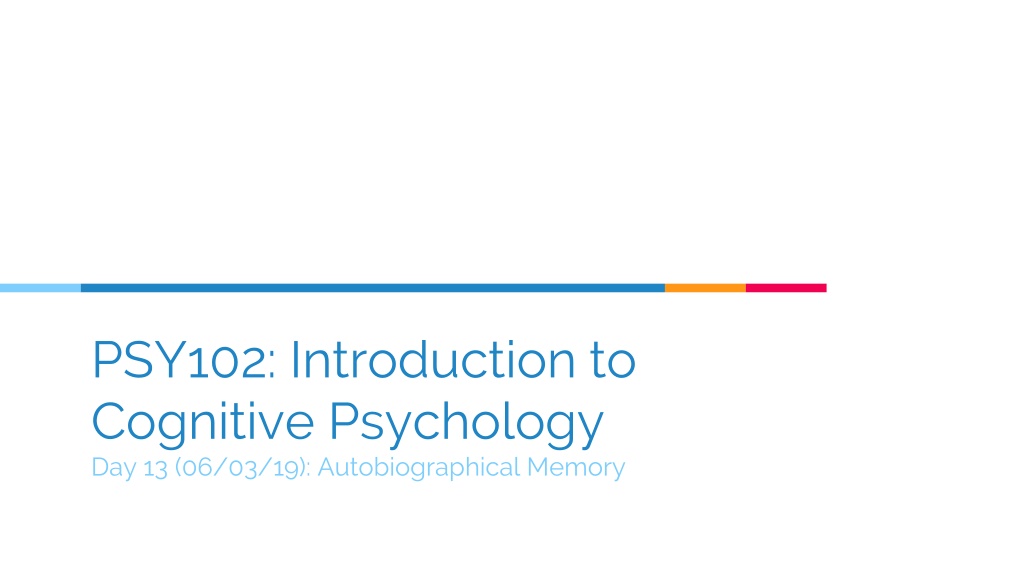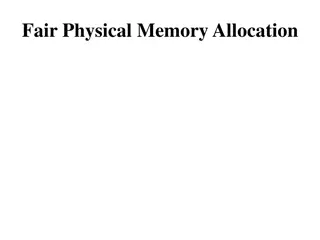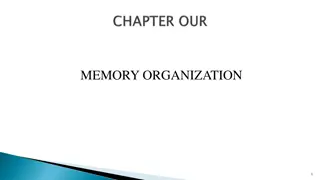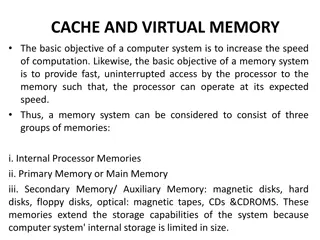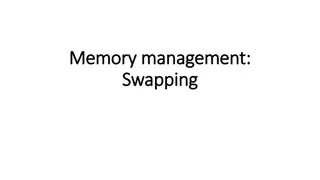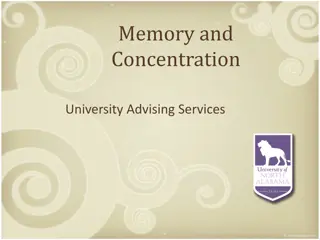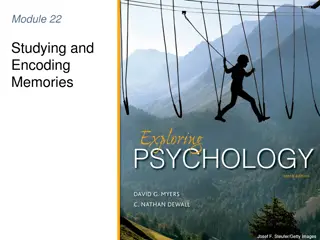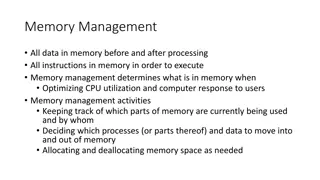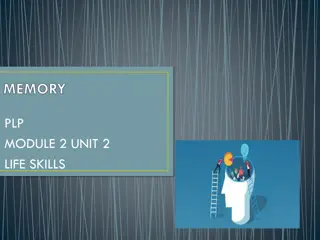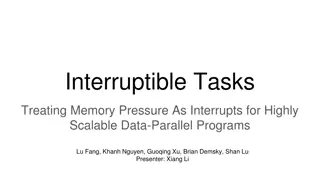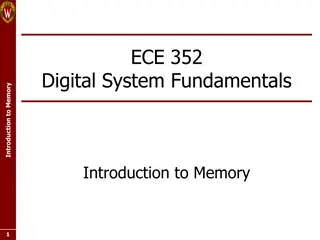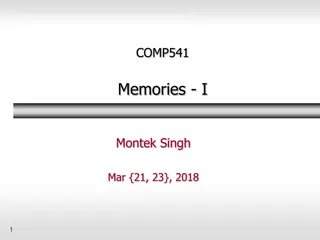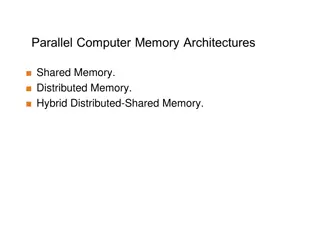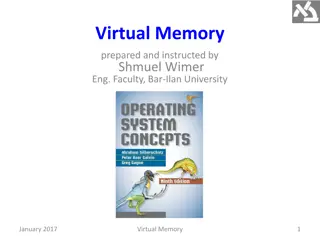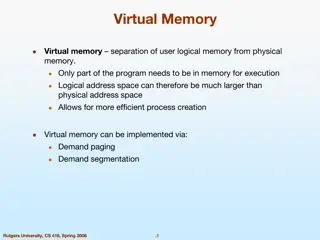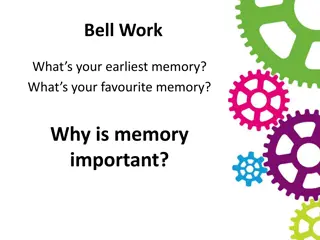Insight into Autobiographical Memory and Learning Strategies
Explore the principles of autobiographical memory and effective learning techniques discussed in today's cognitive psychology class. Topics covered include long-term memory processes, spaced learning, encoding strategies, and critical analysis of academic journal articles. Engage in peer feedback sessions to enhance science communication skills and reinforce classroom culture.
Download Presentation

Please find below an Image/Link to download the presentation.
The content on the website is provided AS IS for your information and personal use only. It may not be sold, licensed, or shared on other websites without obtaining consent from the author. Download presentation by click this link. If you encounter any issues during the download, it is possible that the publisher has removed the file from their server.
E N D
Presentation Transcript
PSY102: Introduction to Cognitive Psychology Day 13 (06/03/19): Autobiographical Memory
Todays Goals + Agenda 1. LO1: Continue to build a supportive classroom culture & discuss science communication Peer feedback on multiple SciComm paragraphs 2. LO2: Define, identify, and apply previous constructs that we have discussed in class Quiz on material covered since last class: multiple choice & short answer 3. LO3: Describe the basic fundamental principles of autobiographical memory Review LTM: Processes material First memories, flashbulb memories, reminiscence bump, memory as constructive, deficient & superior AM 4. LO4: Summarize and critically analyze academic journal articles Are there practical applications of these memory findings, like in Leung (2019)? Worksheet on journal articles
Minute Paper Nothing!
Peer Feedback on Multiple Paragraphs SciComm Continue to build a supportive classroom culture & discuss science communication
Peer Feedback Exchange your outlined multiple paragraphs with someone nearby Take about 5 minutes to read & mark-up the paper, then 5 minutes to discuss over your comments with your FB partner
Review: LTM Processes & Mechanisms Describe the basic fundamental principles of autobiographical memory
Spaced Learning Distributed versus massed practice Difficult to maintain close attention throughout a long study session Studying after a break gives feedback about what you already know To remember something for one week, it s recommended that you intersperse your studying of particular topics by periods spaced 12 to 24 hours apart; for longer retention, extend the spacing interval In part why summer session is not actually good, via cog psych...
Other Factors that Aid Encoding Visual imagery (paired associates; boat-tree) Generation effect (demos, worksheets) Relating words to survival value Study tips: Elaborate Generate & test Avoid illusion of learning Sleep
Consolidation Transforms new memories from fragile state to more permanent state Synaptic consolidation occurs at synapses, happens rapidly Systems consolidation involves gradual reorganization of circuits in brain
Information Storage at the Synapse Long-term potentiation (LTP) Enhanced firing of neurons after repeated stimulation Structural changes & enhanced responding in the postsynaptic neuron Repetition suppression
Standard Model of Consolidation Retrieval depends on hippocampus during consolidation; after consolidation hippocampus is no longer needed Reactivation: hippocampus replays neural activity associated with memory
Consolidation: Not Everything Has Been Solved Multiple trace hypothesis Questions the assumption that the hippocampus is important only at the beginning of consolidation Hippocampus: activated during retrieval of recent & remote memories Hippocampus response can change over time Ripples...
Can You Modify Memories? Memory Pill Part I This is a video about an experimental medication that reduces the strength of traumatic memories. Propranolol Reconsolidation Memory is constructive, possibly never permanent b/c needs to be updated (cc: Shute, 2014) Real-world clinical impact?
Autobiographical Memory Describe the basic fundamental principles of autobiographical memory
Interactions between Episodic & Semantic Episodic can be lost, leaving only semantic Acquiring knowledge may start as episodic but then fade to semantic Semantic can be enhanced if associated with episodic Autobiographical memory: memory of specific experiences, includes semantic and episodic Personal semantic memory: semantic memories that have personal significance The seating arrangement y all have locked into Can influence what we experience (episodic) by determining what we attend to
Autobiographical Memory (AM) Memory for specific experiences from our life, which can include both episodic and semantic components Mental time travel Multidimensional Spatial, emotional, and sensory components
Autobiographical Memory (AM) Sensory component Greenberg and Rubin (2003) Patients who cannot recognize objects also experience loss of autobiographical memory Visual experience plays a role in forming and retrieving AM
AM at Duke Cabeza and coworkers (2004) Comparing brain activation caused by autobiographical memory and laboratory memory Participants viewed Photographs they took (A- photos) Photographs taken by someone else
AM at Duke Both types of photos activated similar brain structures Medial temporal lobe (MTL) (episodic) Parietal cortex (processing of scenes) A-photos activated more of the Prefrontal cortex (information about self) Hippocampus (recollection) Note that you can t reverse inference what activation in these brain regions means Like in the All in the Mind podcast, this is autobiographical memory network
AM at Duke Is it really meaningful to say that one activates more?
Memory Over the Lifespan What events are remembered well? Significant events in a person s life Highly emotional events Transition points Beginning of college? End?
Reminiscence Bump Participants over the age of 40 asked to recall events in their lives Memory is high for recent events and for events that occurred in adolescence and early adulthood (between 10 and 30 years of age)
Reminiscence Bump - Why? Self-image Becoming who you are Cognitive Encoding better during rapid change Cultural life script Maybe culture pushes us to remember (falling in love, college, getting married, kids)
Emotion x Memory Emotional events remembered more easily and vividly Emotion improves memory, becomes greater with time (may enhance consolidation) Brain activity in amygdala Usually tested with emotional vs. neutral words, pictures, etc.
Flashbulb Memories Memory for circumstances surrounding shocking, highly charged important events Mass shootings, eclipse Election Days, college acceptance 9/11/01 Kennedy assassination Challenger explosion (Cultural components of memory: Collective Memory day) Where you were, and what you were doing Highly emotional, vivid, and very detailed But does that make them more accurate?
Flashbulb Memories Flashbulbs are not photograph memories, as they can change with the passage of time Repeated recall Initial description: baseline Later reports compared to baseline Results suggest that these memories can be inaccurate or lacking in detail Even though participants report that they are very confident and that the memories seem very vivid
Perhaps because of Emotion? Rimmele and coworkers (2011) Memories for negative emotional pictures were stronger, and associated with greater confidence
Or Narrative Rehearsal Narrative rehearsal hypothesis Repeated viewing/hearing of event TV, newspaper, radio, talking with others E.g., Princess Diana, 9/11 Could introduce errors in own memory
Memory Is Constructive Memory = What actually happens + person s knowledge, experiences, and expectations More later on the ramifications re: False Memory & Misinformation
What do you notice here? It was 23 December 1989 when I was 12 days old. I was lying down on the sheepskin car cover of the four-wheel-drive and my parents were taking a picture of me, and I was just looking up at the camera wondering what it was, looking up at the steering wheel of the car because I was on the driver's seat wondering what it was -Becky Sharrock from All in the Mind podcast
Memory Is Constructive It was 23 December 1989 when I was 12 days old. I was lying down on the sheepskin car cover of the four-wheel-drive and my parents were taking a picture of me, and I was just looking up at the camera wondering what it was, looking up at the steering wheel of the car because I was on the driver's seat wondering what it was -Becky Sharrock from All in the Mind podcast
First Memories Recall and write a title and description for your earliest memory. Has to be something you remember, not just based off a photograph or story. Title should be long & specific enough that if you read it again, you know the memory. Do you see the memory in your PoV or from an observer perspective? How old (in years) were you when the event happened? How intense was your emotional response to the remembered event? 1 = not very intense, 2 = very intense How vivid is the memory? 1 = low, 3 = moderate, 5 = high How often have you talked & thought about the memory? Same 1-5
Examples I can still see the pattern of the hood trim from the inside, the toy strung across with yellow, pink and blue plastic lambs that rattled when I hit them, and the inside of the sun shade that was clamped to the pram when the sun was shining green lining and a tiny abstract/flower pattern --Improbably Early memory (1 year) I remember that it was my 4th birthday and that mu uncle had bought me a loopy loo doll. It was almost as big as me and had blue hair and a blue check dress --Probable memory (3 year)
What age group do you fall in? Akhtar et al., 2015, Psych Sci
Memory Content Akhtar et al., 2015, Psych Sci
An Explanation? The present findings pose a major conundrum: The child and young adult research, as reviewed earlier, concludes that earliest memories cannot exist below about the age of 2 years and that there would be comparatively few memories below the age of 3 years . Incorrect estimates of dates? But semantic analysis Self-selection bias? No differences in rehearsal Largely imagined...fictional memories? Thus, we suggest that what a rememberer has in mind when recalling fictional improbably early memories is an episodic-memory-like mental representation consisting of remembered fragments of early experience and some facts or knowledge about his or her own infancy or childhood. In addition, further details may be nonconsciously inferred or added, such as that one was wearing a nappy (diaper) when standing in the cot. Akhtar et al., 2015, Psych Sci
Severely Deficient Autobiographical Memory ...Here we report data from three healthy, high functioning adults with the reverse pattern: lifelong severely deficient autobiographical memory (SDAM) with otherwise preserved cognitive function. Successfully employed (one w/ PhD!) Remember/Know Selected two events from each of six lifetime periods (1 week ago, 1 month ago, 1 year ago, 10 years ago, teenage years, and childhood) that were specific in time and place. Future & Past Events Rated for Detail, etc.
What Does It Mean? We report data from three healthy adults with a mnemonic syndrome that is confined to an inability to mentally travel backwards in time in the absence of detectable neuropathology or significant daily life handicap Their self-reported selective inability to vividly recollect personally experienced events from a first-person perspective was corroborated by absence of functional magnetic resonance imaging (fMRI) and event- related potential (ERP) biomarkers associated with naturalistic and laboratory episodic recollection, as well as by behavioral evidence of impaired episodic retrieval, particularly for visual information. Yet learning and memory were otherwise intact, as long as these tasks could be accomplished by non-episodic processes.
Academic Articles Summarize and critically analyze academic journal articles
Rubin et al. (2019) & Stanley et al. (2017) - Autobiographical Memory Fill out or discuss the associated worksheet on the papers you read for today with the person closest to you
Quiz # 3 Define, identify, and apply previous constructs that we have discussed in class
Todays Goals + Agenda 1. LO1: Continue to build a supportive classroom culture & discuss science communication Peer feedback on multiple SciComm paragraphs 2. LO2: Define, identify, and apply previous constructs that we have discussed in class Quiz on material covered since last class: multiple choice & short answer 3. LO3: Describe the basic fundamental principles of autobiographical memory Review LTM: Processes material First memories, flashbulb memories, reminiscence bump, memory as constructive, deficient & superior AM 4. LO4: Summarize and critically analyze academic journal articles Are there practical applications of these memory findings, like in Leung (2019)? Worksheet on journal articles
Tomorrows Work Readings Chapter 9 from textbook on Knowledge/Categorization I.e., no accessible academic articles Assignments Opening paragraph of science summary Midsemester feedback survey
